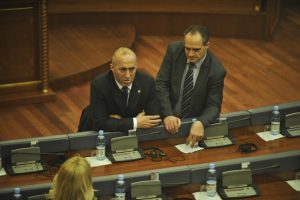Prishtina Insight provides a brief rundown of Ramush Haradinaj’s 678 days of governance and the decisions that will have profound effects on Kosovo’s future.
In 2005, Ramush Haradinaj’s 100-day tenure as Kosovo’s Prime Minister was interrupted by an indictment accusing him of committing war crimes. Officials from his party, the Alliance for the Future of Kosovo, AAK, praised him for running the most “successful government” Kosovo had seen in the aftermath of the war.
The glorification of Haradinaj’s 100 days continued for more than a decade, until Haradinaj took office for a second time in September 2017, welcoming another opportunity to test himself as Kosovo’s prime minister, now an independent state.
But Haradinaj’s second stint as prime minister was halted, once again as a result of his involvement in the war. Another call came from The Hague – this time from the Kosovo Specialist Chambers and Specialist Prosecution Office, known as the ‘Special Court,’ that will try the crimes allegedly committed by the Kosovo Liberation Army, KLA – summoning Haradinaj to the Netherlands for “questioning.”
The Court has not accused Haradinaj of committing a crime. However, he still decided to step down, explaining he did not want to come to the Hague as a state official and “humiliate” Kosovo.
In comparison to his first 100 days, so highly praised by AAK in 2005, his leadership from 2017 to 2019 was filled with decisions that, while failing to improve the lives of the majority of Kosovo citizens, may have profound effects on both the economic and political future of Kosovo.
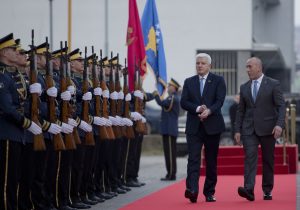
Montenegro’s Prime Minister Dusko Markovic and his Kosovo counterpart Ramush Haradinaj, right, review the honor guard during a welcoming ceremony in Kosovo capital Prishtina, Wednesday Feb. 14, 2018. Markovic is on two day official visit to Kosovo. (AP Photo/Visar Kryeziu)
From the ratification of the demarcation agreement with Montenegro to passing a law almost doubling his own salary; from the expansion of the Kosovo Security Force’s mandate to the 100 per cent tariff increase on Serbian goods, we remember the controversial decisions that have shaped Haradinaj’s tenure as Kosovo’s prime minister and ask: Will it be the last we see of him?
Demarcation and visa liberalization
Within months of coming to power, Haradinaj ended one of the longest standoffs of the previous administration, one that ultimately led to its downfall. In March 2018, the Kosovo Assembly, under Haradinaj’s governance, ratified the border demarcation agreement between Kosovo and Montenegro, despite his vehement opposition to the same deal in 2015.
This long standing issue was cited by the European Union as one of the last conditions that had to be met as a prerequisite for Kosovo to be granted visa liberalization, allowing Kosovo passport holders to travel to the Schengen zone without visas, leading many in Kosovo to celebrate Haradinaj’s role pushing it through.
As Haradinaj traveled to the Netherlands on Tuesday to be questioned by the Special Court, ordinary citizens of Kosovo remain unable to travel freely within the Schengen zone, with visa liberalisation still seeming a distant prospect.
“Congratulations, congratulations to Kosovo,” said Haradinaj in May last year when the European Parliament passed a resolution in favor of entering into interinstitutional negotiations with other EU bodies concerning visa-free travel for Kosovo citizens.
On May 30, 2017, Haradinaj promised that with the new government, Kosovo citizens would travel visa-free to the Schengen zone within 90 days. BIRN’s fact-checking network Krypometer found Haradinaj’s promise to be “completely false.”
The asymmetrical treatment of Kosovo in comparison to other EU membership candidate countries has been criticized, as it remains the only country in the Western Balkans that requires visas to travel. Haradinaj, besides blaming the EU, promised that the free movement of people is a matter of weeks away, only a day before he handed in his resignation.
A different approach with Serbia
While Haradinaj’s relations with Montenegro were seen as amicable following ratification of the agreement, the same cannot be said with Serbia.
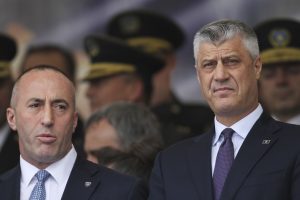
Kosovo president Hashim Thaci, right, and Kosovo prime minister Ramush Haradinaj participate in a Kosovo Security Force military and police force parade in capital Pristina on Sunday Feb. 18, 2018, marking the 10th anniversary of the country’s independence. (AP Photo/Visar Kryeziu)
When asked in September 2017 what the new government’s approach to the dialogue with Serbia would be, Haradinaj announced that he “had homework to do” in Kosovo and declined to take part in the Brussels dialogue. “For the dialogue, I don’t think I have time,” he said when his mandate began.
However, in the summer of 2018, when Thaci began circulating the idea of changing the borders with Serbia, Haradinaj’s silence came to an end.
As did Kosovo’s negotiations with Serbia under the Brussels dialogue. Serbian officials then justified the continued halt in the negotiations with reference to the introduction of the 100 per cent tariff increase on all products coming into Kosovo from Serbia and Bosnia and Herzegovina in November. The tariff still remains in place, with Haradinaj warning that the tariff might remain in place “forever.”
Haradinaj continued with the implementation of the tariff increase, despite relations with Serbia straining even further and pressure from the international community to end it. It was reported that during the Berlin Summit in March, French President Emmanuel Macron was furious when Haradinaj refused to scrap the tax hike. “You’re in no position to ask for anything,” said Macron to Haradinaj, raising his voice during the meeting.
The tariff increase was also met with objection from AAK’s biggest coalition partner, PDK, who asked Haradinaj to remove the tariff in order to be in line with the stance of the international community. The steely determination to keep the tax in place is believed to be the main reason that AAK’s relationship with its big brother started to get icier.
In foreign relations, Haradinaj’s government lost points across the board, failing to join international law enforcement cooperation organization INTERPOL, UNESCO, the Council of Europe or to secure a seat at the United Nations.
Moreover, Haradinaj’s foreign service, headed by minister Behgjet Pacolli, secured only two recognitions of Kosovo’s statehood during his 678 days in power. On the contrary, countries like Suriname and Guinea Bissau announced the withdrawal of their recognitions, damaging a positive trajectory towards Kosovo’s formal legitimization on the international stage since 2008.
Resolving long standing issues
The expansion of the mandate of the Kosovo Security Force, KSF, in December 2018 is listed as one of the most “successful” deeds of Haradinaj’s government. It was a rare moment when all political parties, including the opposition, backed Haradinaj’s initiative to expand the competences of the KSF.
In June 2018, Haradinaj’s government resolved another long-standing issue, the Law on the Capital City of the Republic of Kosovo. The law, which regulates the general functioning and organization of the capital, gives Prishtina more autonomy at the municipal level and increases its budget, passed in May 2018. The law had been a subject of contentious debate between political parties in previous years.
Generous on jobs
Haradinaj’s governance has benefited many of its partners, and the administration may be best remembered for satisfying the appetite of party members on all sides of government. Haradinaj himself was quoted not knowing the exact number of deputy ministers that were employed in his government, following criticism that it had become excessively large.
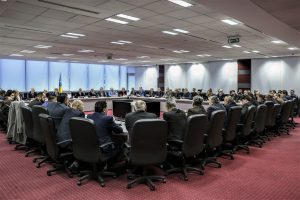
Kosovo PM Haradinaj meets with all the deputy ministers on December 28, 2017. | Photo courtes of the Office of the Prime Minister.
In December 2014, then part of the opposition, Haradinaj criticized the previous government’s public office appointments, insisting that it was “unacceptable” and “an abuse of power” to have more than one deputy minister for each ministry. The previous government had 43 deputy ministers, a number which only increased when Haradinaj came to power.
In September 2018, it was reported that his government appointed 76 deputy ministers, 33 more than the preceding government.
A day before resigning, the prime minister appointed two more deputy ministers. Haradinaj confirmed on Monday in a televised interview that he already knew he had been summoned to the Special Court and would be resigning when he appointed these deputy ministers.
Haradinaj’s government also continually appointed party-affiliated individuals – connected to all coalition partners – to public institutions over the last two years, from the Kosovo Property Comparison and Verification Agency to Kosovo Telecom.
Generous on spending
Kosovo’s state budget allocates four million euros to the state’s emergency reserve fund, which the prime minister has the power to apportion without the Assembly’s approval. More than two million euros of this fund were spent in the first six months of his tenure, with Minister of Finance Bedri Hamza warning that better planning the emergency fund’s spending is required, so that it is not used to pay for things already foreseen throughout the rest of the budget.
Where asphalt is concerned, Haradinaj’s investments were no different from any other government. During his tenure, the highway linking Kosovo with North Macedonia was constructed, costing 800 million euros, and Minister of Transport Pal Lekaj said that construction of a second highway costing one billion euros will begin in October. Allegations of corruption surrounding the construction, as well as criticism that highway construction has become the government’s biggest priority, have dogged Haradinaj’s administration.
The agreement to construct a new coal-fired power plant in Kosovo, Kosova e Re, was another monumental decision from Haradinaj’s government that could have significant impact on the economic and physical well being of Kosovo citizens. The cost will be covered by Kosovo citizens as electricity bills will skyrocket, critics of the plant’s construction wrote. The World Bank has also withdrew its support for the project because of its lack of economic viability.
Workers’ rights?
Haradinaj promised during the first meeting of the government to “undertake concrete action in meeting the demands for workers’ rights in the country.” However, when protesters took to the streets demanding better conditions at work, the prime minister’s approach did not match up with his promises.
In July 2018, when Kosovo’s firefighters protested in front of the government building, demanding better conditions at work, Haradinaj tried to discuss the issue with protesters in person. When a protester called public officials “thieves,” Haradinaj responded to the firefighter: “Who is that calling me a thief? I don’t know if I stole his mother or father,” an odd response made in anger when attempting to address the crowd.
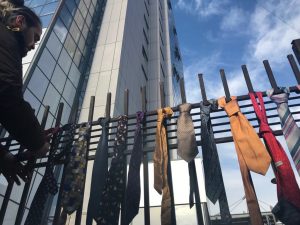
Kushtrim Mehmeti, one of the organizers of the ‘humanitarian action’ to ‘aid the Prime Minister’, places donated ties on the government fence. Mehmeti and his organization collected about 300 ties, in a humorous bid to ‘aid’ PM Ramush Haradinaj, who said he gave himself a salary raise because he has to purchase “ties and shirts.” “Don’t worry PM,” Mehmeti said. “If you need ties and shirts, we will provide them.” | Photo: Die Morina BIRN.
This has been justified by members of his government, such as political advisor Halil Matoshi, as a “genuine” way that a politician should conduct himself when in power.
Haradinaj kept his promise to the workers of the Kosovo Energy Corporation, KEK, to increase KEK employee salaries by 100 euros. This promise had no impact on the budget, however, as KEK used money raised from electricity bills to pay for this increase.
On International Workers’ Day on May 1, the Union of Independent Trade Unions of Kosovo asked the government to increase the minimum wage from 135 euros (under 35s) or 170 euros (over 35s) euros to 250 euros per month across all sectors, asked for equal wages for equal work, to implement the Law on Labor, increase safety at work and reduce the retirement age by 10 years.
However, BIRN’s fact-checking network, Kryptometer, verified that none of the five government meetings held that month were used to discuss the demands of trade unionists, and the demands were never addressed.
Interference in independent institutions
In August 2018, the findings of special prosecutor Elez Blakaj that thousands of fake veterans are receiving non-merited pensions led to hot-blooded responses from Haradinaj, after he was once more called a “thief.”
In a televised interview, Haradinaj said it was Blakaj who was “a thief,” and “a punk who fled to Bllace [a Macedonian refugee camp during the Kosovo War].”
The inflated veterans lists detail that more than 40,000 people are receiving pensions, with more than 19,000 (according to Blakaj’s indictment) of these people falsely verified. In 2018, more than 70 million euros were spent on the war veterans’ pension scheme.
In the Dukagjini region alone, where Haradinaj was the regional commander during the war, more than 30,000 people received certificates verifying them as war veterans.
Haradinaj himself stated in the year 2000 that in the Dukagjini region there were no more than 3,000 KLA fighters.
Haradinaj and other officials’ reaction to Blakaj’s findings led the special prosecutor to leave Kosovo for the United States “to continue his studies.” The attack on Blakaj was condemned by opposition parties and the international community as an interference in the functioning of the justice system.
In his last days as prime minister, Haradinaj also attacked the National Quality Council, NCQ, over their decision to scrap institutional accreditation for public universities in Peja, Prizren and Mitrovica. Although the NCQ is an independent body mandated to assess the quality of higher education institutions, Haradinaj called the experts involved in the evaluation process “mafia.”
Will Haradinaj take office a third time?
During his resignation, Haradinaj stated his resignation was appropriate because he wants to be questioned as an individual, a Kosovo citizen, when in the Hague. Yet, he immediately confirmed that in the elections that are likely to be held in the upcoming months, he will again stand for election as prime minister. If he runs for prime minister while the investigation continues, the motivation for his resignation may be called into question.








